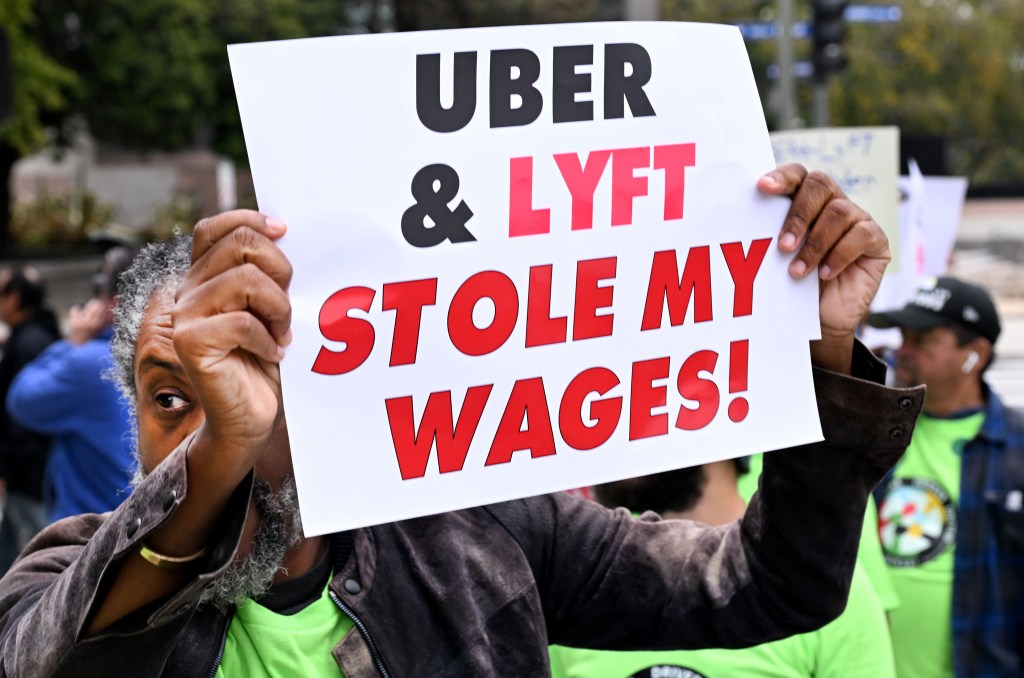By Yue Stella Yu | CalMatters
After years of tussling with gig companies, California’s labor unions want to once again expand workers’ rights — this time by allowing ride-hailing drivers to unionize.
And as in tussles past, expect steep opposition from the businesses.
Backed by California’s Service Employees International Union, Democratic lawmakers unveiled a measure Tuesday that would allow drivers to bargain with companies like Uber and Lyft for better pay and benefits, a step toward more protections for gig workers.
“We stand for the principles that all work has dignity,” said Oakland Assemblymember Buffy Wicks, who introduced Assembly Bill 1340, at a press conference. “We stand for the right of every worker to truly have a voice.”
The SEIU said more than 600,000 ride-hail drivers statewide would benefit if the legislation is adopted and signed into law.
Uber said in a statement that the proposed legislation would make rides in California more expensive “while threatening the flexible jobs thousands depend on.”
“Drivers have been clear: They want to stay independent and keep the freedom to choose when and how they work, with access to meaningful benefits,” the statement said.
Lyft spokesperson CJ Macklin declined to tell CalMatters where the company stands on the measure, but said that Proposition 22, approved by voters in 2020, reflected voters’ will and that the company is working to “improve drivers’ experience.”
The effort for worker unionization mirrors a voter-approved ballot measure in Massachusetts, the first state to give app-based drivers the right to collective bargaining.
Companies winning labor battle
In California, the effort comes nearly five years after rideshare companies blocked an attempt to recognize gig workers as employees.
A state law that took effect in 2020, known as AB 5, would likely have entitled those workers to unemployment benefits, minimum wage and more.
But gig companies fought it in court and poured more than $200 million into Prop. 22. Voters approved the ballot measure to keep gig workers as independent contractors while the companies promised better benefits the same year. Companies like Lyft, Uber, DoorDash and Instacart spent tens of millions of dollars — more than 10 times the opposition — in support of Prop. 22. After its passage, gig companies raised their prices.
But no state agency has been enforcing Prop. 22 since it took effect, leaving workers waiting years in hopes of their wage and benefits complaints being resolved.
The passage of Prop. 22 snuffed out hope for gig workers to be recognized as employees in California, said Lorena Gonzalez Fletcher, president of the California Labor Federation, who authored AB 5 as a member of the Legislature. She said this year’s proposal is second-best to the initial law.
“We think the right to collectively bargain around a number of issues as independent contractors is far superior to nothing,” she said in an interview. “We are supportive of this, but it obviously is not what we had originally hoped for.”

At the event, many ride-hail drivers deemed Prop. 22 an empty promise from companies like Uber and Lyft, arguing that the companies did not deliver on better wages and benefits.
“Now, we are just their money makers,” said Francisco Magdaleno, a ride-hail driver of nine years in Los Angeles. “This is why we love to have a union. I want us drivers to be able to negotiate, to make things better for everybody.”
But details remain unclear: The measure does not define which drivers would be eligible for collective bargaining or how many votes a union would need from its members to be certified.
Some labor advocates believe lawmakers should go further to try to protect workers, such as setting a minimum wage floor or explicitly protecting workers’ right to strike.
The language of Prop. 22 guaranteed that companies would pay drivers 120% of minimum wage, which translated to payments ranging from $5.64 to $27.58 per hour. Nicole Moore, president of Rideshare Drivers United, said that was too low.
“If you are going to call that a wage floor, it’s really a wage dungeon,” she said, arguing the new legislation should also set a higher wage floor for ride-hailing drivers.
The proposal is expected to be heard in Assembly committees in a few weeks.
CalMatters’ economy reporter Levi Sumagaysay contributed reporting.
Originally Published:



